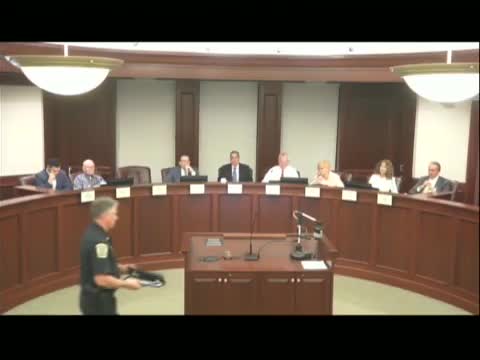Deerfield approves Carbine 911 call-taking system and indoor school mapping
Get AI-powered insights, summaries, and transcripts
Subscribe
Summary
The Deerfield Board of Trustees approved reports to adopt the cloud-based Carbine Apex call-taking system, funded by the Joint Emergency Telephone System Board, and to implement indoor school mapping by GEOCOM using a $151,000 state 911 grant.
The Village of Deerfield Board of Trustees on Oct. 6 approved a pair of public-safety upgrades: purchase of the Carbine Apex cloud-based 911 call-taking solution and implementation of indoor mapping of local schools by GEOCOM.
The Carbine system replaces Deerfield’s Zetron hardware, provides AI-driven features including real-time language detection and translation, GPS location, and indoor mapping of schools, and will cost $272,005.17, the board was told. The expense is covered by funds administered through the Joint Emergency Telephone System Board (JETSB), meaning the village will not pay from its general fund. Officials said a target completion date for the Carbine implementation is March 31, 2026.
The report described a number of features the village expects to gain. The system’s translation capability will automatically detect a caller’s language and translate it for dispatchers instead of routing calls to an external language line, which officials said currently costs the village per-minute fees. The software can also identify geofence events (for example, multiple calls about the same traffic accident) and prompt callers with automated questions to reduce overload during mass-call incidents. The presenter said Glenview’s public-safety dispatch center already uses Carbine and that Deerfield would be among the first public-safety answering points (PSAPs) in Illinois to adopt it. "Time is of the essence," the presenter said. "It automatically detects the language, and it’ll translate to the dispatcher in English."
Officials also described public education steps: the village will run social media and public-information outreach to remind residents that text-to-911 remains available and to explain the new features.
Separately, the board approved a report to implement indoor mapping of the region’s schools using GEOCOM. The village said it received a $151,000 grant from the Illinois 911 Bureau earlier in 2025 and partnered with Cook County and three other agencies to fund mapping of 18 schools across the four towns the village dispatches for. The mapping uses laser and LiDAR to produce floor-level maps so dispatchers can identify whether a 911 caller at a school is, for example, in a classroom, gymnasium or auditorium, rather than only seeing a rooftop dot on an aerial view. Officials said the project should be completed in November. "Now when the caller calls 911, we’ll see a picture with the roof cut off and know exactly what classroom or hallway the caller is in," a presenter said.
Trustees asked how indoor maps will be updated after school renovations; staff said major additions would require re-mapping but that minor changes would be handled in routine updates. A presenter also noted Senate Bill 2577 (as cited in the meeting) and said the village took the initiative to apply for the grant ahead of broader state action. Officials said private schools and special institutions in the service area were included in the mapping agreements.
Both reports were approved by voice and roll-call votes. During the Carbine discussion the presenter noted the project is funded with the 911 surcharge (the state-controlled fee currently described in the discussion as $1.50 per line) and that JETSB previously approved the purchase.
The actions do not create a new local tax; officials said the Carbine purchase is funded through the established JETSB/911-surcharge mechanism and the mapping project is funded by the state 911 grant. Staff cautioned there may be hiccups during transition and that training and phased rollouts are planned.
The board’s approval covers all dispatching jurisdictions the village serves, which the presenters said includes Lincolnshire, Riverwoods, Bannockburn and Deerfield itself, and officials said other PSAPs have asked Deerfield to report back on the system’s performance once it is live.
Votes at a glance: trustees present recorded the motions and voted to approve both reports on Oct. 6.
